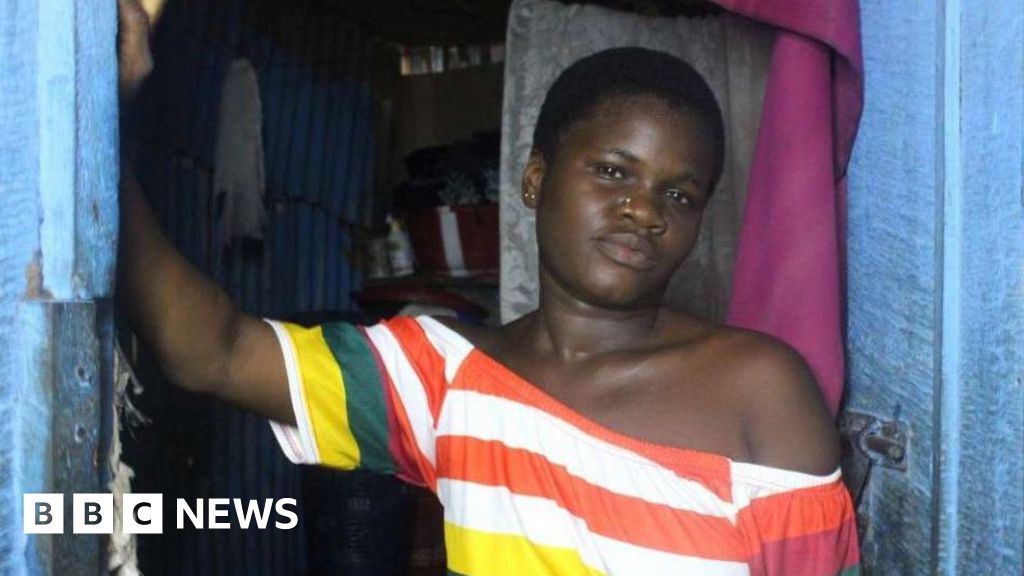By Jake Wood, BBC News NI
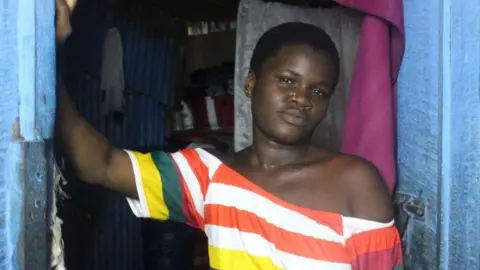 Jalahan Sesay
Jalahan SesayWhen the inside of your home feels as hot as an oven, it can be impossible to cope.
During the dry season, that was the daily reality for Khadija Kamara, living in the Kroo Bay settlement of Freetown, Sierra Leone.
Her home has recently had a reflective panel installed, aimed at reducing the temperature indoors.
Belfast-based Peter Dynes is one of the leaders of MEER (Mirrors for Earth’s Energy Rebalancing), which has been working with local councils.
“It’s about adapting to the fact that climate change is accelerating,” he told BBC News NI.
The panels, which he said can help reduce internal temperatures by over 6C, involve a highly reflective coating made up of recycled materials.
Khadija told BBC News NI she recently lost her six month old son Ibrahim due to the extreme heatwaves, which are becoming more common in western Africa.
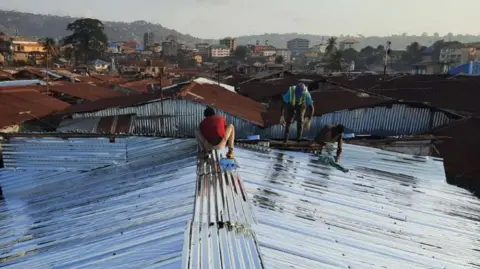 MEER
MEER The project began its first installation in Freetown.
It aims to mitigate the impacts of the extreme heat facing the region.
According to one resident, it is already changing lives.
About half a million people in Freetown live in densely populated informal settlements, or shanty towns.
Most of the homes within these settlements are built using zinc-coated corrugated metal sheets, which rust, erode and trap in heat from the sun, making heatwaves increasingly dangerous for residents.
“People are effectively baking inside their own homes,” said Mr Dynes.
Much of western Africa has recently experienced an exceptionally hot dry season and an extended heatwave, increasing the health risks and reducing the quality of life for people living in the region.
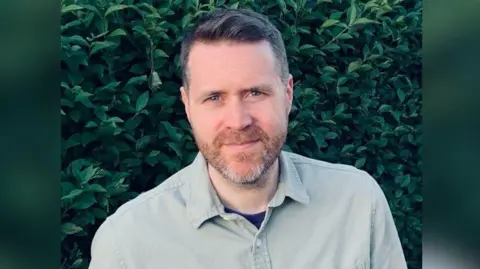 Peter Dynes
Peter DynesFar from a new idea
This March was the hottest on record, the tenth month of record heat in a row globally.
And as the temperatures around the world climb higher, developing nations are racing to think of new ways to adapt to the new reality of extreme weather.
For Mr Dynes, more affordable, scalable and effective solutions are needed to combat the ever-increasing threat of heat and extreme weather.
But using reflective surfaces as a method of passive cooling is far from a new idea.
This is a way to cool down homes without using mechanical means like air conditioning.
Mr Dynes told BBC News NI that “albedo, or reflective modification, has been used for many many years, hundreds if not thousands in fact.
“When you go to Greece or Spain or wherever, whole villages are usually painted white.
“This is the same idea.”
According to Mr Dynes, “the problem with using paints, especially in the tropics, is that it soils very quickly and very easily because of the humidity and dust”.
“What’s needed is something which is far more durable, lasts longer and is more effective.”
The project also aims to utilise reflective panelling in an agricultural setting to help reduce groundwater evaporation and protect against drought.
MEER’s next project is in India, a country many experts say is now recording more intense, frequent heatwaves that are also longer in duration.
 Jalahan Sesay
Jalahan Sesay‘Impossible to cope’
BBC News NI spoke to Khadija Kamara from the Kroo Bay settlement in Freetown, who had an ‘ultra cool’ roof installed on her home last year.
She said her son died due to exposure from heat which can be “impossible to cope” with.
“Inside my home, the heat was often unbearable,” she said.
Before the installation of the cool roof, she said: “I usually had to sleep outside.
“It was too hot during the day to carry out chores like cooking and cleaning.”
Khadija said that hers is one of the few homes with electricity in Kroo Bay, but an electric fan would circulate hot air around and make the heat worse.
“It was bad for my health, and I would always have heat rash all over my body.”
Since having the reflective roof installed, Khadija said her “day-to-day living is much better, and I can get on with my life more comfortably”.
As the Intergovernmental Panel on Climate Change (IPCC) reported, Sierra Leone was ranked as the third most vulnerable country to climate change.
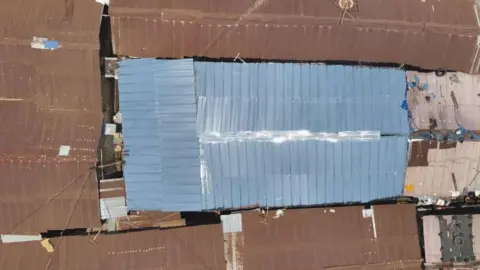 MEER
MEERInnovations in adaptation
It is expected that 2024 will be the hottest year on record, likely exceeding 2023, where global average temperatures were 1.48C above the pre-industrial average.
This could make 2024 the year when for the first time the global average temperature goes above the nominal 1.5C Paris Agreement benchmark.
According to Dr Satish Kumar, from the School of Natural and Build Environment at Queen’s University, “climate change has forced humans to consciously acknowledge and adapt to the new normal of disrupted and unseasonable weather cycles”.
He recognises that “innovation and affordability are key” for adaptation and mitigation in the global south.
While on a small scale, this simple method is proving to be effective in reducing the impact of heat for individuals and families.
There are, however, question marks over larger scale projects such as Solar Radiation Modification (SRM) technology, which would attempt to cool the planet by reflecting solar radiation back into space.
A recent UN report calls for cautious consideration and extensive research before any deployment of such methods.
Mr Dynes pointed out that there is an increasingly “competitive market” for innovations in adapting to climate change.
However, he reiterated that MEER does not aim to be a “huge production non-profit organisation”.
Mr Dynes said that MEER is still in “early stages”, and its findings are yet to be independently reviewed.

